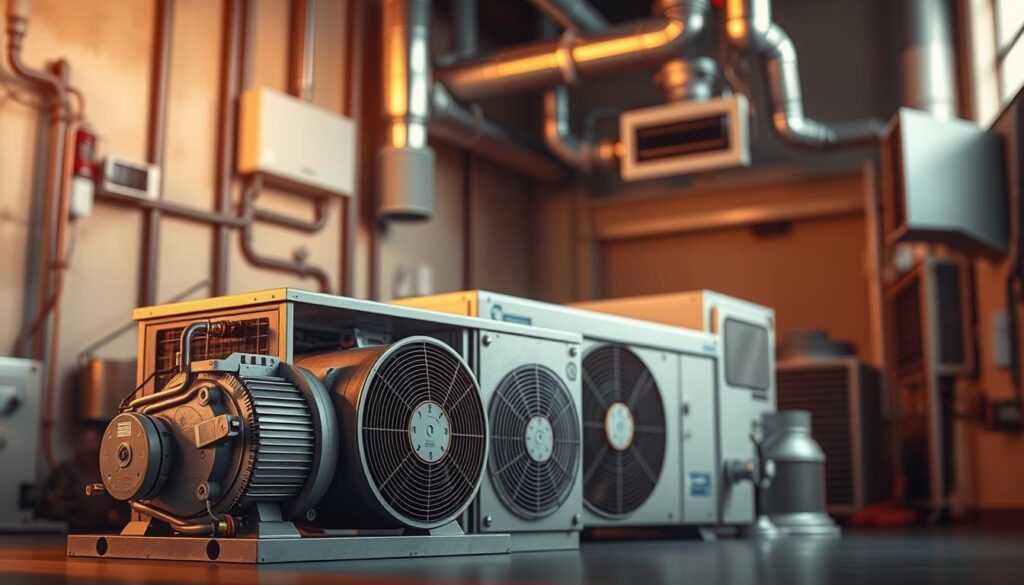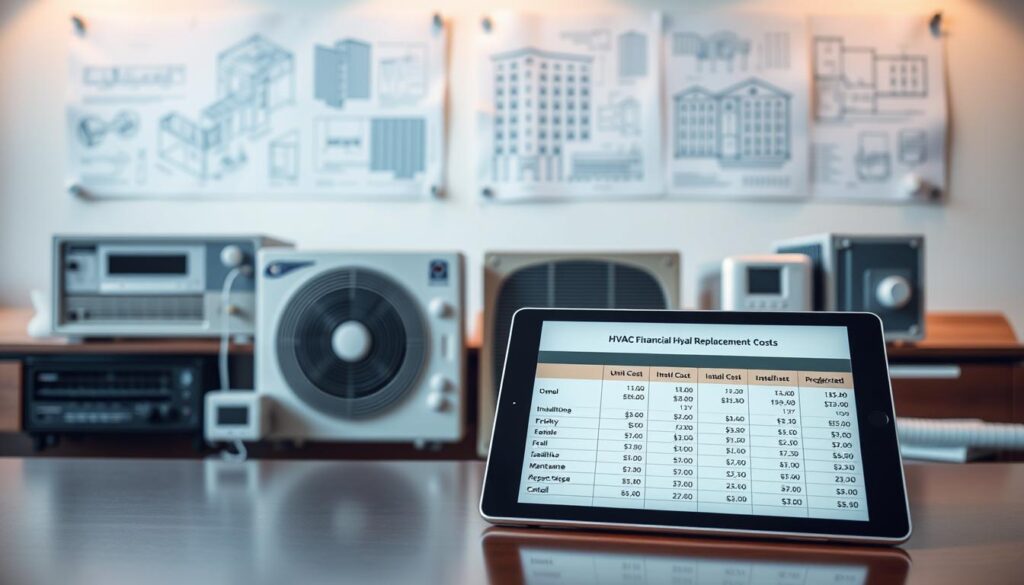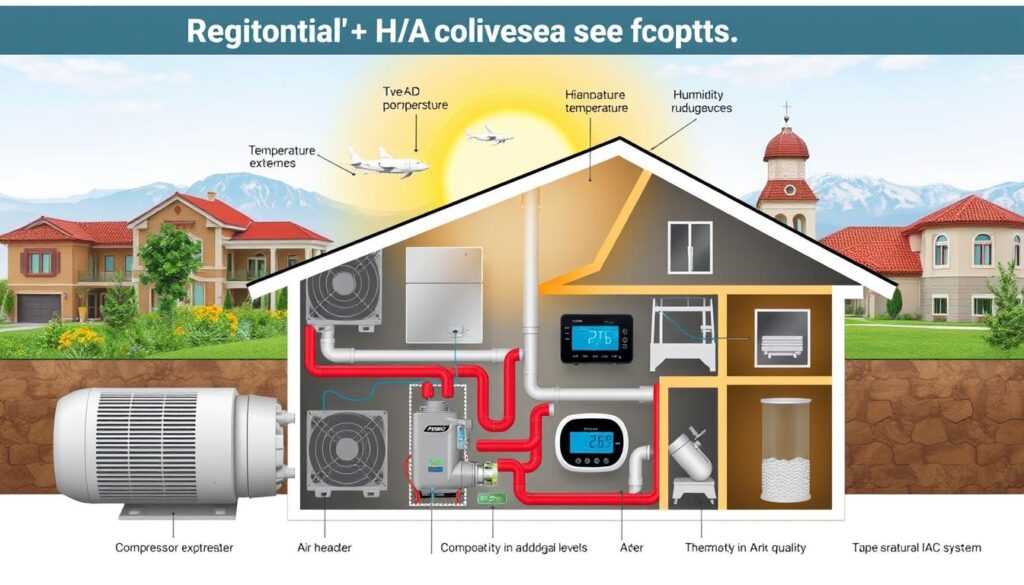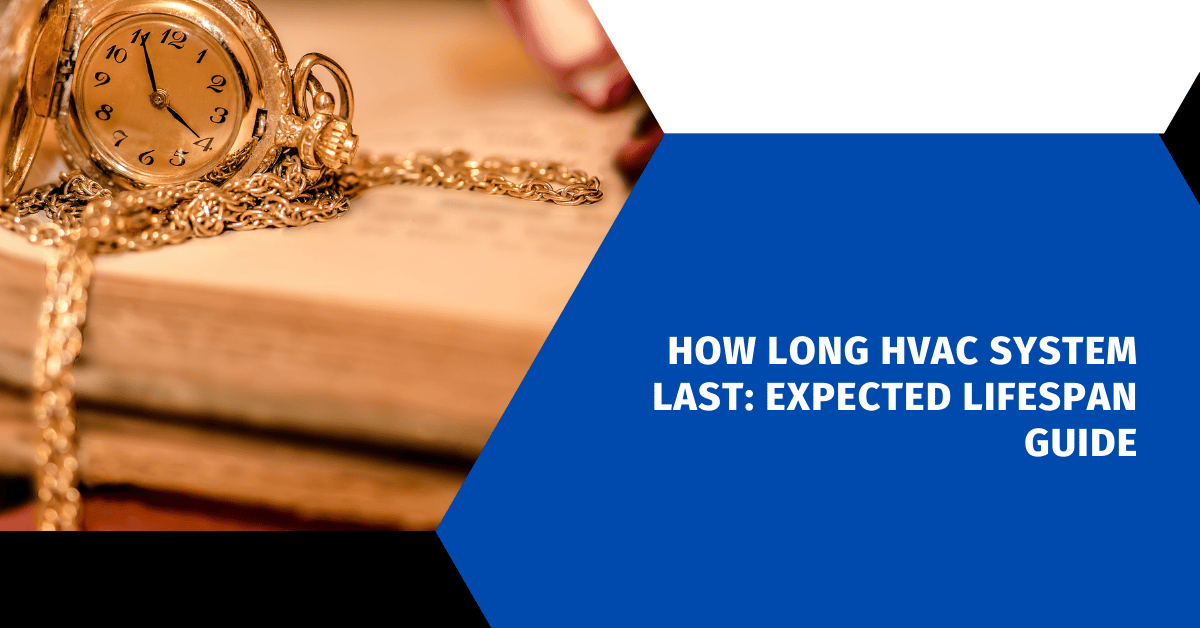Affiliate Disclosure
HVAC Guide Guys is a participant in the Amazon Services LLC Associates Program, an affiliate advertising program designed to provide a means for sites to earn advertising fees by advertising and linking to Amazon.
How Long HVAC System Last? How many years will your HVAC system last before it needs to be replaced? Knowing how long an HVAC system lasts is key for homeowners. It helps them get the most out of their investment and keep their homes comfortable.

Most HVAC systems last between 15 to 25 years. But, this time can vary. It depends on how well you maintain it, how often you use it, and the environment around it.
Knowing when to replace your system can save you a lot of money. It also keeps your home at a comfortable temperature. The trick is to know what affects your system’s life and watch for signs it’s failing.
Key Takeaways
- Average HVAC system lifespan ranges from 15 to 25 years
- Regular maintenance can significantly extend system durability
- Different HVAC components have varying expected lifespans
- Professional annual inspections are key for system health
- Environmental factors impact overall system performance
Table of Contents
Understanding HVAC System Basics
Your home’s comfort relies on many HVAC system parts working well together. Knowing these parts helps keep your system running smoothly and lasts longer.
Today’s HVAC systems are complex. They control your home’s temperature, humidity, and air quality. These systems have many important parts that work together to make your home comfortable.
Key HVAC System Components
The main parts of an HVAC system are:
- Furnace or heat source
- Air conditioning unit
- Heat pump
- Ductwork
- Thermostat
- Air filters
Roles of Different HVAC Units
Each part has its own job. The furnace heats your home. The air conditioner cools and removes humidity. Heat pumps can both heat and cool, giving you control over your space’s temperature.
Common HVAC System Types
There are several types of HVAC systems for homes:
- Central Air Systems: The most common in homes
- Heat Pump Systems: Great for mild climates
- Ductless Mini-Split Systems: Perfect for cooling and heating specific areas
- Geothermal Systems: A green option
Knowing about these parts and systems helps you choose the best for your home’s comfort and energy use.
Average Lifespan of Different HVAC Components
Knowing how long your HVAC parts last is key for keeping your home comfy and saving money. Different HVAC units last for different times, based on their type and how well they’re taken care of.
Your HVAC system has many parts, each lasting a certain amount of time. Here’s a detailed look at how long they usually last:
- Furnaces: 15-30 years
- Boilers: 20-35 years
- Central Air Conditioners: 15-20 years
- Heat Pumps: 10-20 years
- Ductless Mini-Splits: 10-30 years
Things that affect when you might need to replace your HVAC include how much you use it, how often you get it checked, and your environment. A well-kept system can last much longer than one that’s not well cared for.
Parts like compressors and heat exchangers are often what decide how long your system will last. Signs that it’s time for a new one include corrosion, needing repairs often, and not working well.
Getting your HVAC checked by pros twice a year can make your parts last longer.
Buying good quality equipment and getting regular checks from experts can make your HVAC system work better and last longer.
Explore Our HVAC Shop
Looking for top-rated HVAC tools, parts, and accessories? Visit our shop and find the perfect solution for your needs.
Visit the ShopHow Long HVAC System Last: Key Factors Affecting Durability
Your HVAC system’s life span depends on several important factors. These factors can greatly affect how well it works and how long it lasts. Knowing about these elements helps you take care of your home and keep your system running smoothly.
Many key parts affect your HVAC system’s durability and how well it works:
Environmental Impact on System Life
Different places can be tough on HVAC systems. Places near the coast with lots of salt, very hot or cold areas, and places with a lot of humidity can make systems wear out faster. Places with corrosive environments may shorten system life by up to 25%.
- Coastal regions with salt air exposure
- Extreme temperature fluctuations
- High humidity environments
- Areas with significant dust or pollution
Usage Patterns and System Stress
How you use your HVAC system affects how long it lasts. Running it a lot, setting the thermostat wrong, and not taking care of it can make it break down sooner.
| Usage Intensity | Potential Lifespan Impact |
|---|---|
| Low Stress Usage | 20-25 years |
| Moderate Usage | 15-20 years |
| High Stress Usage | 10-15 years |
Installation Quality Considerations
Getting your HVAC system installed right is key to its durability. If it’s not sized right, if the ductwork is wrong, or if it’s installed poorly, it won’t work as well or last as long.
“A well-installed HVAC system can last up to 25% longer than a poorly installed one.” – HVAC Professional Insight
By knowing about these factors, you can make better choices about taking care of your system, how you use it, and when to upgrade. This will help your HVAC system work better and last longer.
Explore Our HVAC Shop
Looking for top-rated HVAC tools, parts, and accessories? Visit our shop and find the perfect solution for your needs.
Visit the ShopSigns Your HVAC System Needs Replacement
Knowing when to replace your HVAC system can prevent costly repairs and unexpected breakdowns. Homeowners should watch for key warning signs that suggest it’s time for a new system.
The age of your HVAC system is a major factor. Most systems last 10-15 years, with some lasting up to 20 with good care. Older systems tend to be less efficient and more expensive to run.
- Frequent repairs costing more than 50% of a new system’s price
- Rising utility bills showing decreased energy efficiency
- Inconsistent temperatures in your home
- Unusual noises or strange odors from your HVAC unit
- Excessive humidity or poor air quality
Knowing these signs can help you decide on your home’s comfort and budget. It’s important to evaluate your system’s performance thoroughly.
| Warning Sign | Potential Impact |
|---|---|
| Repair Costs | Exceeding 50% of new system price |
| Energy Efficiency | 30% increase in energy bills |
| System Age | Over 10-15 years old |
| Performance Issues | Uneven cooling/heating |
“Proactive replacement can prevent unexpected system failures and reduce long-term expenses.”
When thinking about replacing, compare your current system to modern, energy-efficient models. New HVAC technologies offer better comfort, energy savings, and environmental benefits.
Essential Maintenance Tips to Extend HVAC Lifespan
Keeping your HVAC system in good shape is important. Regular care helps it last longer and work better. It also saves energy and keeps your home comfortable.
Good maintenance tips can stop expensive repairs and keep your system efficient. Here are some key ways to keep your HVAC system running well.
Regular Filter Replacement
Air filters protect your HVAC system. Experts suggest a maintenance plan for filters:
- Check filters monthly
- Replace or clean filters every 1-3 months
- Use high-quality filters for better air quality
Professional Service Requirements
“An annual professional inspection can prevent major system failures and optimize performance.” – HVAC Professionals Association
Professional maintenance is vital for your HVAC system:
- Identify problems early
- Clean important parts
- Keep the system running efficiently
Seasonal Maintenance Checklist
| Season | Maintenance Tasks |
|---|---|
| Spring | Clean outdoor unit, check refrigerant levels |
| Summer | Inspect ductwork, clean condensate drain |
| Fall | Service heating system, check thermostat |
| Winter | Seal air leaks, lubricate moving parts |
Remember, consistent maintenance is key to maximizing your HVAC system’s lifespan and ensuring energy-efficient performance.
Explore Our HVAC Shop
Looking for top-rated HVAC tools, parts, and accessories? Visit our shop and find the perfect solution for your needs.
Visit the ShopCost Considerations for HVAC Replacement

Homeowners need to know about hvac replacement costs when upgrading their heating and cooling systems. The cost can be high, with prices ranging from $6,500 to $15,000. Several factors will affect your final cost.
The cost of hvac replacement includes:
- Equipment pricing
- Labor installation
- Additional system modifications
- Potential ductwork adjustments
Different HVAC systems have different prices:
- Standard Air Conditioner: $4,000 – $12,000
- Heat Pump: $4,500 – $12,500
- Gas Furnace: $2,800 – $8,000
- Geothermal System: $18,000 – $30,000
While the initial cost may seem high, hvac energy savings can help. Energy-efficient models can lower your power bills a lot. ENERGY STAR suggests replacing systems every 10-15 years for best performance and energy savings.
Here are more financial tips:
- Look into tax credits for energy-efficient upgrades
- Check for manufacturer rebates
- Explore financing options
- Compare long-term savings to immediate costs
Getting a new HVAC system is more than just spending money. It’s a smart choice that can make your home more comfortable, efficient, and valuable.
Explore Our HVAC Shop
Looking for top-rated HVAC tools, parts, and accessories? Visit our shop and find the perfect solution for your needs.
Visit the ShopModern HVAC Technology and Longevity Improvements
The HVAC industry has seen big changes, introducing new technologies that boost system performance and efficiency. Now, your home’s comfort and energy use can be managed with great precision and smarts.
New technologies are changing hvac system upgrades, giving homeowners better and greener options. These advancements not only make HVAC systems more efficient but also make them last longer.
Smart HVAC Features
Today’s HVAC systems come with smart tech that changes how you control your home’s climate:
- Wi-Fi-enabled smart thermostats
- Predictive maintenance diagnostics
- Remote system monitoring
- Automated energy optimization
Energy-Efficient Innovations
New technologies are making HVAC systems work better:
| Innovation | Efficiency Benefit |
|---|---|
| Variable-speed motors | Up to 40% energy savings |
| Multi-stage heating/cooling | Reduced energy consumption |
| High SEER ratings | Enhanced system performance |
Sustainable Options
Eco-friendly HVAC options are becoming more popular, providing long-term benefits for the environment and your wallet:
- Geothermal heat pumps with extended 25-year lifespans
- Solar-assisted HVAC systems
- Refrigerants with lower environmental impact
These advancements mean your HVAC system will stay efficient, green, and keep your home comfortable for many years.
Explore Our HVAC Shop
Looking for top-rated HVAC tools, parts, and accessories? Visit our shop and find the perfect solution for your needs.
Visit the ShopRegional Factors Affecting HVAC Lifespan

Your HVAC system’s life span depends a lot on where you live. Different places have their own challenges that can greatly affect how well your system works.
Living near the coast can be tough on your HVAC. Salt-laden air and high humidity can make it corrode faster. This can cut down its life to 7-12 years, compared to the usual 15-20 years. You’ll need special equipment and more upkeep.
The weather where you live also matters a lot. Here are some things to think about:
- Extreme heat zones need more cooling power
- Cold areas require strong heating systems
- Humid places cause more moisture damage
- Deserts bring dust problems
“Your HVAC system is as much a product of its environment as it is of its manufacturing,” says HVAC expert Michael Rodriguez.
When picking an HVAC system, look into your local weather. Choose units made for your area’s climate. Getting it installed by experts who know your area can make it last longer.
Take care of your HVAC by knowing how local factors affect it. Use maintenance plans that fit your area’s needs.
Conclusion
Knowing how long your HVAC system lasts is key to a comfy and efficient home. Most systems last 15 to 25 years. But, how long yours lasts depends a lot on how well you take care of it.
Regular maintenance is a big help. Simple steps like changing air filters and getting yearly checks can make a big difference. These actions keep your system running well and save you money on repairs.
Watch for signs it’s time to replace your system, like high energy bills or constant repairs. New HVAC tech is more energy-efficient, saving you money over time. Being informed helps you make choices that save you money now and later.
Every HVAC system is different. Its lifespan depends on how it was installed, the environment it’s in, and how well you maintain it. Taking good care of your system keeps your home comfortable and saves you money.

